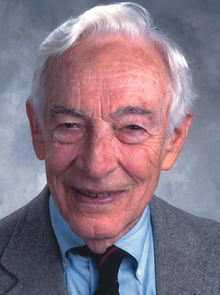Albert J. Stunkard, M.D.: A Tribute (February 7, 1922-July 12, 2014)

Albert J. Stunkard, M.D.—Mickey to his friends and colleagues—died July 12 from complications of cardiopulmonary disease at the age of 92. Mickey was an early pioneer in obesity research who achieved world recognition as one of the very few psychiatrists to devote himself exclusively to this field.
He received his bachelor of science from Yale and his M.D. degree from Columbia. He did a fellowship in psychiatry at Johns Hopkins in the early 1950s. His first faculty appointment was at Cornell University Medical College, where he became interested in research in obesity. By the late 1950s, he had relocated to Philadelphia and the University of Pennsylvania, where he spent almost all of his professional life, including serving as its chair of psychiatry from 1962 to 1973. It was there in 1973 that Mickey founded the Center for Weight and Eating Disorders. In 1973, he moved to California to become chair of psychiatry at Stanford University for three years before returning to Penn. Upon his return, he continued as director of the Center for Weight and Eating Disorders and was its director emeritus from 1993 until his death. Until recently, he commuted daily from his home in Bryn Mawr, Pa., to his office on Penn’s West Philadelphia campus.
Throughout his illustrious career, Mickey was the recipient of many awards, including the Johns Hopkins Society of Scholars, the Distinguished Service Award of the American Psychiatric Association, the Thomas William Salmon Medal of the New York Academy of Medicine, the William Osler Patient Oriented Research Award from the University of Pennsylvania, and the Rhoda G. and Bernard G. Sarnat International Prize in Mental Health of the Institute of Medicine (IOM) of the National Academy of Sciences. He was a member of the IOM since 1988. He had also served on the editorial boards of many of our most prestigious journals, including the Archives of Psychiatry and Psychotherapy.He was the author or coauthor of over 500 publications. In recent years he had focused his clinical interest on night eating syndrome and campaigned energetically in support of including it as a separate syndrome among DSM-5’s eating disorders. He and his colleagues at Penn cogently defended their position in a 2008 editorial, “Issues for DSM-5: Night Eating Syndrome” in the American Journal of Psychiatry.
Mickey was prescient in many ways. Some will remember his often-quoted 1958 paper in which he wrote, “Most obese people will not stay in treatment for obesity. Of those who stay in treatment, most will not lose weight, and of those who do lose weight, most will regain it.”
Despite this negative prediction (and its accuracy more than 50 years later), Mickey persevered in his research. Early on, he appreciated that obesity is not a “single disease with a single etiology,” but rather “the end stage of a variety of different conditions with different etiologies.” Mickey had been the first person to describe both clinical syndromes of binge eating and night eating back in the 1950s. His papers have become classics in the vast field of obesity research—he was also one of the first to address issues of class differences in the prevalence of obesity, as well as to confront the history of both prejudice and overt discrimination suffered by obese individuals.
Always the psychiatrist, Mickey called our attention to “dieting depression,” a constellation of symptoms secondary to the stress of dieting, and noted that dropping out of a weight-loss program “was a highly adaptive method of coping with impending complications” in those “biologically vulnerable.”
He studied many ways of treating obesity, including behavioral methods, bypass surgery, and psychoanalysis. His conclusion about psychoanalysis: “Even an uncontrolled study makes it clear that psychoanalysis is an expensive way to lose weight.”
One of his most important contributions is his work on the genetics of obesity with his Danish adoption studies published in the 1980s in the New England Journal of Medicine. With colleagues, he had also devised the Three-Factor Eating Questionnaire, a version of which is still in use today.
Mickey’s research has had a major influence on my own thinking about the daunting science of weight control. When I approached Mickey by mail, he graciously and generously, without even knowing me, agreed to write the foreword to my book, The Gravity of Weight, a book suffused throughout with references to his work. I met Mickey only once, shortly afterward, one warm October day a few years ago when he invited me to visit him at Penn. By then Mickey was almost 90, and he was having difficulty breathing but insisted that we walk to one of his favorite restaurants several blocks away. At lunch I asked how he had gotten the name “Mickey.” He told me his mother had had an exceptionally difficult labor and delivery with him, and he was born with two blackened eyes. It was not clear that he would survive. His parents thought he had looked like an Irish prizefighter and nicknamed him “Mickey,” a name that apparently stuck all through the years. Ironically, he developed an interest in Zen Buddhism and meditation during his World War II service in Japan. The indomitable spirit of the prizefighter, however, persisted throughout his life. ■



